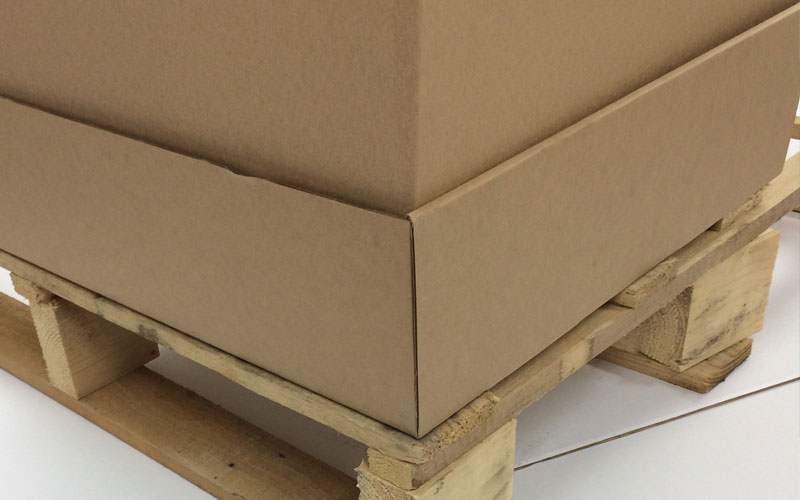It’s fair to say that pallets have revolutionised the warehousing and distribution industry worldwide. In some circles, these humble wooden workhorses are even considered as one of the most significant commercial inventions of the 20th Century, along with the barcode.

According to a 2015 Forestry Commission study, there are approximately 250 million pallets in use in the UK, with over 40 million new ones being made each year.
So what is a pallet box?
Put simply, pallet boxes (sometimes also known as ‘bulk boxes’) are large robust corrugated boxes attached to wooden pallets. You’ve probably seen them in your local supermarket filled with bags of potatoes – or pumpkins at Halloween.
How are pallet boxes constructed?
Most pallet boxes come in three distinct parts, all made of single, double or triple wall corrugated cardboard with stitched joints. Firstly, there’s the ‘tray’ which sits on the wooden pallet, then the ‘sleeve’ which forms the sides of the box, and finally a pallet box ‘topper’ or ‘cap’ which is effectively a lid. Heavy duty strapping is often used to keep these three separate parts together once packed.
Pallet box sizes
The most common pallet box sizes in the UK and Europe are: Standard 1/1 Europa (1200mm x 800mm x 800mm), and Standard 1/2 Europa (600mm x 800mm x 800mm). If you need something tailor-made in a different size, Reliant Packaging can design and manufacture bespoke pallet boxes to meet your exact requirements.
Advantages of pallet boxes
Pallet boxes can dramatically reduce transport and shipping costs, because you can pack lots of items (or smaller boxes) inside – much easier and cheaper than moving lots of smaller boxes around.
Other advantages of corrugated pallet boxes are:
- Ideal for protecting larger unboxed items in transit
- Easily collapsible for flat pack storage when not in use
- Heat treated pallets – suitable for export use
- Fit snugly into shipping containers with no space wasted
- Can be stacked, saving on valuable warehouse space
The transport packaging of choice for many clients
Many clients will now only accept goods on pallets – it’s easy to see why…
- Quicker loading and unloading of lorries using standard fork lift trucks
- Significant reductions in labour costs
- Better for worker health and safety
- Reduced risk of damage to products
- More efficient use of lorry, container and warehouse space
- Better air circulation for items which need this – for example fresh produce
Interesting fact about pallet boxes
In the USA and Canada, pallet boxes are often called ‘gaylord boxes’ – named after the Gaylord Container Corporation of St Louis, Missouri, the inventor and first manufacturer of pallet boxes back in the early 1900s. We think we’ll stick with pallet boxes…
